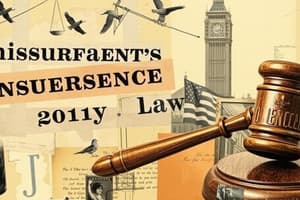Podcast
Questions and Answers
Which of the following is not a requirement for a valid contract?
Which of the following is not a requirement for a valid contract?
- Consideration
- Agreement
- Unilateral terms (correct)
- Competent parties
Which condition allows contract ambiguities to be resolved in favor of the policyholder?
Which condition allows contract ambiguities to be resolved in favor of the policyholder?
- Unilateral
- Fiduciary
- Aleatory
- Adhesion (correct)
What must be present for a party to be legally competent to enter into a contract?
What must be present for a party to be legally competent to enter into a contract?
- Presence of mind and a witness
- Authorization/licensing and capacity (correct)
- Being an adult over the age of 18
- Insurer approval
What does 'utmost good faith' imply in an insurance contract?
What does 'utmost good faith' imply in an insurance contract?
Which element of a valid contract is defined as the 'lawful exchange of one value for another'?
Which element of a valid contract is defined as the 'lawful exchange of one value for another'?
What characteristic of an insurance contract refers to an 'uncertain outcome'?
What characteristic of an insurance contract refers to an 'uncertain outcome'?
If a contract is found to have a legal purpose, what does it imply?
If a contract is found to have a legal purpose, what does it imply?
Which of the following elements is not uniquely a characteristic of insurance contracts but is essential for any contract?
Which of the following elements is not uniquely a characteristic of insurance contracts but is essential for any contract?
Flashcards are hidden until you start studying
Study Notes
Essential Elements of a Valid Contract
- A valid contract requires four essential elements: Agreement, Consideration, Competent Parties, and Legal Purpose
- Agreement involves an offer and acceptance, representing a meeting of the minds between the parties
- Consideration is the lawful exchange of one value for another, e.g., Application Information + Premium = Insurance Coverage
- Competent Parties means both parties must be legally competent to enter into a contract, with exceptions for minors, the insane, and those under the influence
- Legal Purpose means the contract must not be contradictory to the good of the public
Characteristics of an Insurance Contract
- Unilateral: a one-sided contract where the insurer makes a promise in exchange for an act already performed by the policyholder
- Adhesion: a contract where the policyholder must adhere to the terms drafted by the insurer, with ambiguities resolved in favor of the insured
- Aleatory: a contract where one party may receive a value greater than what was paid, based on a possible future happening
- Conditional: a contract where the insurer's promise to pay is conditioned on certain events or circumstances
- Personal: life insurance contracts are personal in nature, benefiting individuals
- Utmost Good Faith: both parties must act with honesty and integrity
- Fiduciary: a contract involving a position of trust and financial responsibility
Studying That Suits You
Use AI to generate personalized quizzes and flashcards to suit your learning preferences.




